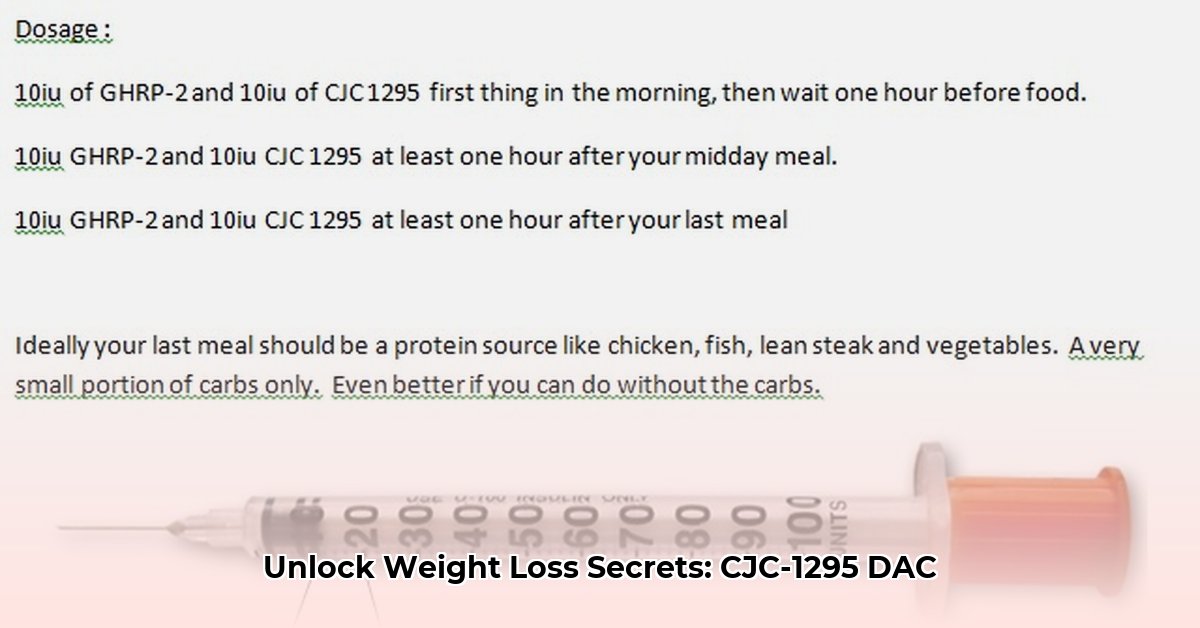
CJC-1295 DAC and Weight Loss: A Critical Review of the Evidence
Losing weight effectively remains a significant challenge, prompting ongoing exploration of novel approaches. CJC-1295 DAC, a modified version of the growth hormone secretagogue CJC-1295, has garnered attention for its potential role in weight management. However, translating preclinical findings and limited human data into safe and effective weight-loss strategies requires a critical examination of the current research landscape. This review synthesizes existing evidence, highlights critical knowledge gaps, and underscores the regulatory hurdles hindering widespread application.
Understanding CJC-1295 DAC's Mechanism of Action
CJC-1295 DAC (where DAC stands for drug affinity complex) is a synthetic peptide designed to stimulate the release of growth hormone (GH) from the pituitary gland. This stimulation occurs through its mimicry of the body's natural growth hormone-releasing hormone (GHRH). The DAC modification distinguishes it from its predecessor, resulting in a significantly extended half-life (5-8 days) compared to the original CJC-1295. The increased GH levels, in turn, influence metabolic processes implicated in weight management, including enhanced muscle protein synthesis and increased lipolysis (fat breakdown). While this mechanism suggests potential, translating this into clinically significant weight loss requires robust clinical evidence, currently lacking.
Current Evidence and Research Limitations
Early preclinical studies in animal models have demonstrated increased GH and insulin-like growth factor-1 (IGF-1) levels following CJC-1295 DAC administration. Higher doses generally correlated with higher hormone levels. This finding, while promising, doesn't directly translate to human weight loss. The limited available human data consists mainly of small studies showing potential benefits. However, these studies are insufficient to establish efficacy or determine safe and effective dosages for weight loss. How can we confidently determine the efficacy of CJC-1295 DAC in humans when we haven’t completed the needed large scale studies?
The absence of large-scale, well-designed human clinical trials constitutes a major limitation. Therefore, the following key research gaps hinder definitive conclusions:
- Optimal Dosage: The lack of human data prevents the determination of a safe and effective dosage for weight loss. Animal studies provide some clues, but interspecies extrapolation is unreliable.
- Long-Term Safety Profile: The long-term effects of CJC-1295 DAC on various organ systems remain unknown, necessitating extensive longitudinal studies.
- Efficacy and Mechanism in Humans: Establishing definitively whether CJC-1295 DAC contributes to clinically meaningful weight loss in humans requires rigorous, large-scale trials.
- Individual Variability: Genetic predisposition, body composition, and comorbidities likely influence the response to CJC-1295 DAC, thus requiring personalized dosing strategies and additional research.
Regulatory Hurdles and Clinical Implications
Currently, CJC-1295 DAC is primarily used in research settings. Before its widespread clinical application for weight loss or any other medical purpose, it must undergo rigorous evaluation and meet the regulatory standards of agencies like the FDA (Food and Drug Administration) and other international bodies. These require substantial evidence of safety and efficacy before approval for therapeutic use. The compound's current regulatory status, coupled with its inclusion on the World Anti-Doping Agency (WADA) prohibited list, highlights the considerable distance between preclinical research and clinically validated application.
Interpreting CJC-1295 DAC Research for Clinical Application: A Practical Framework
Given the current limitations in the research, drawing conclusions about CJC-1295 DAC’s efficacy and safety for weight loss requires a critical approach. A step-by-step framework is necessary:
- Verify the CJC-1295 Variant: Distinguish between CJC-1295 and CJC-1295 DAC due to significant differences in their pharmacokinetic properties.
- Scrutinize Study Design: Prioritize randomized controlled trials (RCTs) with large sample sizes, robust methodologies, and appropriate control groups, carefully assessing any potential bias.
- Analyze Data Objectively: Focus on statistically significant findings concerning weight change (including body composition changes), relevant biomarkers (GH and IGF-1 levels), and adverse events.
- Acknowledge Study Limitations: Recognize the inherent limitations of any study, including sample size, duration, and methodological constraints.
- Prioritize Safety Data: Critically examine available safety data and acknowledge the absence of long-term safety data as a significant limitation.
- Interpret Cautiously: Avoid making definitive claims based on limited or inconclusive evidence.
Stakeholder Perspectives and Future Directions
The successful translation of CJC-1295 DAC into a clinically viable weight-loss aid depends on the collaborative efforts of multiple stakeholders:
| Stakeholder | Role |
|---|---|
| Researchers | Designing and conducting large-scale, well-controlled human clinical trials |
| Regulatory Agencies | Establishing clear criteria for clinical trials and evaluating safety data |
| Pharmaceutical Companies | Funding research, developing optimized formulations, and navigating regulatory pathways |
| Clinicians | Providing evidence-based advice to patients; avoiding unsubstantiated claims |
| Consumers | Avoiding use outside of controlled research settings |
Conclusion: The Need for Continued Research
In conclusion, while CJC-1295 DAC's mechanism of action suggests a potential role in weight management by boosting GH and IGF-1 levels, current evidence is insufficient to support its use as a weight-loss intervention. Large-scale, well-designed human clinical trials are urgently needed to establish safe and effective dosages, understand long-term safety implications, and conclusively determine its efficacy for weight loss. Until this evidence emerges, using CJC-1295 DAC for weight loss remains unsupported and potentially risky. This information is for educational purposes only and does not constitute medical advice. Consult a healthcare professional before making any decisions related to your health or treatment.